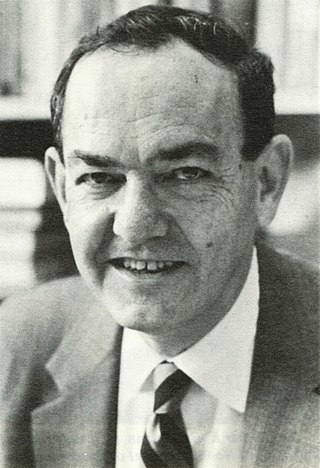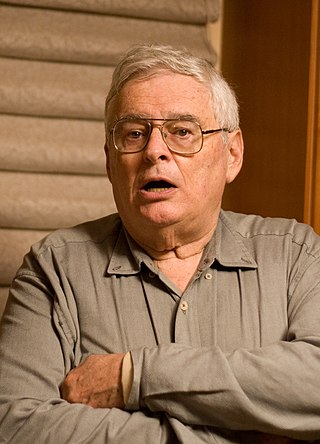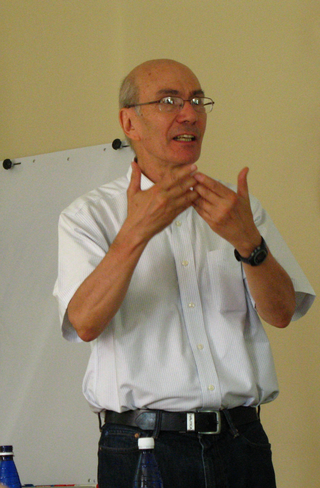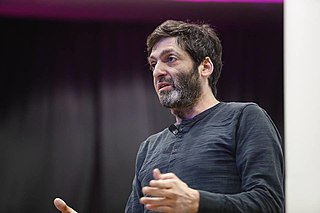
Herbert Alexander Simon was an American political scientist whose work also influenced the fields of computer science, economics, and cognitive psychology. His primary research interest was decision-making within organizations and he is best known for the theories of "bounded rationality" and "satisficing". He received the Nobel Memorial Prize in Economic Sciences in 1978 and the Turing Award in computer science in 1975. His research was noted for its interdisciplinary nature and spanned across the fields of cognitive science, computer science, public administration, management, and political science. He was at Carnegie Mellon University for most of his career, from 1949 to 2001, where he helped found the Carnegie Mellon School of Computer Science, one of the first such departments in the world.

Cognitive neuroscience is the scientific field that is concerned with the study of the biological processes and aspects that underlie cognition, with a specific focus on the neural connections in the brain which are involved in mental processes. It addresses the questions of how cognitive activities are affected or controlled by neural circuits in the brain. Cognitive neuroscience is a branch of both neuroscience and psychology, overlapping with disciplines such as behavioral neuroscience, cognitive psychology, physiological psychology and affective neuroscience. Cognitive neuroscience relies upon theories in cognitive science coupled with evidence from neurobiology, and computational modeling.

Cognition is the "mental action or process of acquiring knowledge and understanding through thought, experience, and the senses". It encompasses all aspects of intellectual functions and processes such as: perception, attention, thought, imagination, intelligence, the formation of knowledge, memory and working memory, judgment and evaluation, reasoning and computation, problem-solving and decision-making, comprehension and production of language. Cognitive processes use existing knowledge and discover new knowledge.

Leon Festinger was an American social psychologist who originated the theory of cognitive dissonance and social comparison theory. The rejection of the previously dominant behaviorist view of social psychology by demonstrating the inadequacy of stimulus-response conditioning accounts of human behavior is largely attributed to his theories and research. Festinger is also credited with advancing the use of laboratory experimentation in social psychology, although he simultaneously stressed the importance of studying real-life situations, a principle he practiced when personally infiltrating a doomsday cult. He is also known in social network theory for the proximity effect.

Jerry Alan Fodor was an American philosopher and the author of many crucial works in the fields of philosophy of mind and cognitive science. His writings in these fields laid the groundwork for the modularity of mind and the language of thought hypotheses, and he is recognized as having had "an enormous influence on virtually every portion of the philosophy of mind literature since 1960." At the time of his death in 2017, he held the position of State of New Jersey Professor of Philosophy, Emeritus, at Rutgers University, and had taught previously at the City University of New York Graduate Center and MIT.
Selective perception is the tendency not to notice and more quickly forget stimuli that cause emotional discomfort and contradict our prior beliefs. For example, a teacher may have a favorite student because they are biased by in-group favoritism. The teacher ignores the student's poor attainment. Conversely, they might not notice the progress of their least favorite student.
Gilbert Harman was an American philosopher, who taught at Princeton University from 1963 until his retirement in 2017. He has published widely in philosophy of language, cognitive science, philosophy of mind, ethics, moral psychology, epistemology, statistical learning theory, and metaphysics. He and George Miller co-directed the Princeton University Cognitive Science Laboratory. Harman has taught or co-taught courses in Electrical Engineering, Computer Science, Psychology, Philosophy, and Linguistics.
Computational cognition is the study of the computational basis of learning and inference by mathematical modeling, computer simulation, and behavioral experiments. In psychology, it is an approach which develops computational models based on experimental results. It seeks to understand the basis behind the human method of processing of information. Early on computational cognitive scientists sought to bring back and create a scientific form of Brentano's psychology.

Stephen P. Stich is an American academic who is Distinguished Professor of Philosophy and Cognitive Science at Rutgers University, as well as an Honorary Professor in Philosophy at the University of Sheffield. Stich's main philosophical interests are in the philosophy of mind, epistemology, and moral psychology. His 1983 book, From Folk Psychology to Cognitive Science: The Case Against Belief, received much attention as he argued for a form of eliminative materialism about the mind. He changed his mind, in later years, as indicated in his 1996 book Deconstructing the Mind.
Paul Montgomery Churchland is a Canadian philosopher known for his studies in neurophilosophy and the philosophy of mind. After earning a Ph.D. from the University of Pittsburgh under Wilfrid Sellars (1969), Churchland rose to the rank of full professor at the University of Manitoba before accepting the Valtz Family Endowed Chair in Philosophy at the University of California, San Diego (UCSD) and joint appointments in that institution's Institute for Neural Computation and on its Cognitive Science Faculty.

Paul Bloom is a Canadian American psychologist. He is the Brooks and Suzanne Ragen Professor Emeritus of psychology and cognitive science at Yale University and Professor of Psychology at the University of Toronto. His research explores how children and adults understand the physical and social world, with special focus on language, morality, religion, fiction, and art.

Dan Ariely is an Israeli-American professor and author. He serves as a James B. Duke Professor of psychology and behavioral economics at Duke University. Ariely is the co-founder of several companies implementing insights from behavioral science. Ariely wrote an advice column called Ask Ariely in the WSJ from June 2012 until September 2022. Ariely is the author of the three New York Times best selling books Predictably Irrational, The Upside of Irrationality and The Honest Truth about Dishonesty. He co-produced the documentary (Dis)Honesty: The Truth About Lies.
Warren S. Brown is a professor of psychology in the Graduate School of Psychology at Fuller Theological Seminary and the founding director of the Travis Research Institute. Brown received his doctorate in Experimental Physiological Psychology from the University of Southern California (1971). Prior to Fuller, Brown spent 11 years as a research scientist at the UCLA Brain Research Institute. He was a founding member of the National Organization for Disorders of the Corpus Callosum, the International Research Consortium on the Corpus Callosum and Cerebral Connectivity (IRC5), and the International Society for Science and Religion.The "Warren and Janet Brown Scholarship", given annually at Fuller to support students in neuropsychological research, was created to honor Brown and his wife.

The Princeton University Department of Psychology, located in Peretsman-Scully Hall, is an academic department of Princeton University in Princeton, New Jersey. For over a century, the department has been one of the most notable psychology departments in the country. It has been home to psychologists who have made well-known scientific discoveries in the fields of psychology and neuroscience.

Marc Bekoff is an American biologist, ethologist, behavioural ecologist and writer. He was a professor of Ecology and Evolutionary Biology at the University of Colorado Boulder for 32 years. He cofounded the Jane Goodall Institute of Ethologists for the Ethical Treatment of Animals, and he is Professor Emeritus of Ecology and Evolutionary Biology at the University of Colorado Boulder.
Self-expression values are part of a core value dimension in the modernization process. Self-expression is a cluster of values that include social tolerance, life satisfaction, public expression and an aspiration to liberty. Ronald Inglehart, the University of Michigan professor who developed the theory of post-materialism, has worked extensively with this concept. The Inglehart–Welzel Cultural Map contrasts self-expression values with survival values, illustrating the changes in values across countries and generations. The idea that the world is moving towards self-expression values was discussed at length in an article in the Economist. Expressing one's personality, emotions, or ideas through art, music, or drama, is a way to reveal oneself to others in a way that is special to them.
Verbosity, or verboseness, is speech or writing that uses more words than necessary. The opposite of verbosity is plain language.

Matthew Dylan Lieberman is a Professor and Social Cognitive Neuroscience Lab Director at UCLA Department of Psychology, Psychiatry and Biobehavioral Sciences.
Melissa Hines is a neuroscientist and Professor at the University of Cambridge. She studies the development of gender, with particular focus on how the interaction of prenatal and postnatal experience shape brain development and behavior.
Ecoauthoritarianism is a political ideology which attempts to reconcile both environmentalist and authoritarian tendencies. It is justified by the belief of the inevitability and necessity of a strong central government to preserve the environment.










